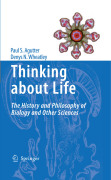
Thinking about life: the history and philosophy of biology and other sciences
Agutter, P.S.
Wheatley, D.N.
This is a popular science book, designed as a sequel to our About Life, though readers need not be familiar with the earlier volume. Indeed, no specialist knowledge is required. The text briefly surveys the nature of science and its emergence in post-Renaissance Europe, and investigates the similarities and differences between biology and other sciences. Major topics in the philosophy of biology (e.g. evolutionary theory, vitalism/mechanism, reductionism/holism, spontaneous generation) are considered in a little more detail. INDICE: 1. What is science? 2. Culture, knowledge and technology. 3. Classical roots. 4. Mediaeval views of the world. 5. The Scientific Revolution. 6. The ‘Scientific Revolution’ in biology. 7. Aristotle’s biology. 8. How different are organisms from inanimate objects? 9. Cell theory and experimental physiology: new ideas in a changing society. 10. Embryos and entelechy. 11. Spontaneous generation. 12. The evolution of Darwinism. 13. The great heredity debate. 14. Evolutionary theory attains maturity. 15. The problem of purpose. 16. The scientific status of biology. Appendix: science and philosophy, Philosophiesof science and scientific practice, The nature of scientific theories, Theorystructure and theory change, Experiments, Models. Bibliography. Index of names. Index of subjects.
- ISBN: 978-1-4020-8865-0
- Editorial: Springer
- Encuadernacion: Cartoné
- Páginas: 274
- Fecha Publicación: 01/12/2008
- Nº Volúmenes: 1
- Idioma: Inglés
